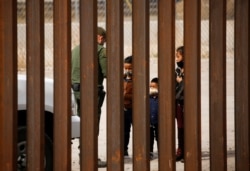President Joe Biden said Saturday that his administration would “increase the number” of refugees allowed into the United States but offered no new details.
Biden, who is spending the weekend at his home in Wilmington, Delaware, spoke to reporters after a golf outing.
"The problem was that the refugee part was working on the crisis that ended up on the border with young people. We couldn’t do two things at once. But now we are going to increase the number,” he said.
Early Friday, Biden signed an executive order keeping the admission of refugees capped at 15,000 for fiscal 2021, a number set by the administration of former President Donald Trump.
But following rapid criticism from Democratic allies, the White House later said Biden planned to lift his predecessor’s historically low cap on refugees and would set a “final, increased refugee cap” by May 15 for the remainder of the fiscal year.
In the executive order, Biden said the cap of 15,000 “remains justified by humanitarian concerns and is otherwise in the national interest.”
However, the executive order also said that if that cap was reached before the end of the fiscal year, then a presidential determination might be issued “to increase admissions, as appropriate.”
The order led to criticism from prominent Democrats, including from Senator Dick Durbin, the second-highest-ranking Democrat in the Senate, who called the limit on refugee admission numbers “unacceptable.”
“Facing the greatest refugee crisis in our time, there is no reason to limit the number to 15,000. Say it ain’t so, President Joe,” Durbin said in a statement.
Following the criticism, White House press secretary Jen Psaki said that Biden’s original announcement had been “the subject of some confusion” and that the president was expected to increase the refugee cap. However, she did not say what the new limitations on refugee admission numbers would be.
Under the order Biden signed, the administration modified the allocation of refugee slots.
The order allocated 7,000 slots for refugees from Africa, 3,000 from Latin America, 1,500 from Europe and Central Asia, 1,500 from the Middle East and South Asia, and 1,000 from East Asia. The remaining 1,000 slots are to be used as required.
According to the most recent data, as of April 2021, the U.S. has resettled just over 2,000 refugees since the current fiscal year began on October 1.
The 2021 ceiling is dramatically lower than in 2016, when it stood at 85,000. The ceiling is also lower than the 62,500 Biden had proposed in his plan to Congress two months ago.
Psaki said Friday that Biden's "initial goal of 62,500 seems unlikely ... given the decimated refugee admissions program we inherited."
Matthew Reynolds, the U.N. refugee agency’s representative to the U.S. and the Caribbean, said in a statement Friday that his agency was “encouraged by the announcement of a planned increase, to be formalized by May 15, in the number of refugees who will be given the chance this year to begin rebuilding their lives in safety and dignity in the United States. Refugee resettlement saves lives.”
Krish O'Mara Vignarajah, president and CEO of Lutheran Immigration and Refugee Service, said that her organization was grateful for Biden’s move to revise U.S. refugee policy but was “deeply” disappointed that the administration left in place the record-low admissions cap of its predecessor.
“While it is true the Trump administration left the resettlement infrastructure in tatters, we feel confident and able to serve far more families than this order accounts for,” Vignarajah said in a statement.
Biden sent a plan to Congress, as required by law, two months ago to raise refugee admission numbers. He also wanted to get rid of restrictions enforced by Trump that have excluded a high number of refugees, including those fleeing war. Though the presidential action does not require congressional approval, presidents in the past announced a refugee cap shortly after the notification to Congress.
The Biden administration has been heavily criticized for not doing the same.
Mark Hetfield, president and CEO of Hebrew Immigrant Aid Society, an international Jewish humanitarian organization that provides services to refugees and asylum-seekers in 16 countries, said that Biden had broken his “repeated promises to significantly raise this year’s refugee admissions cap.”
"The global need for resettlement has never been greater,” Hetfield said.
Psaki said another concern was the record number of unaccompanied migrants crossing the U.S.-Mexico border, which she said had consumed many of the resources that would go into resettling refugees in the U.S.
“It is a factor,” Psaki said, adding that the Office of Refugee Resettlement “does management and has personnel working on both issues, and so we have to ensure that there is capacity and ability to manage both.”
ORR is an office within the Health and Human Services Department, created after the U.S. enacted the Refugee Act of 1980. It provides services such as refugee resettlement and integration to new arrivals in the U.S.










